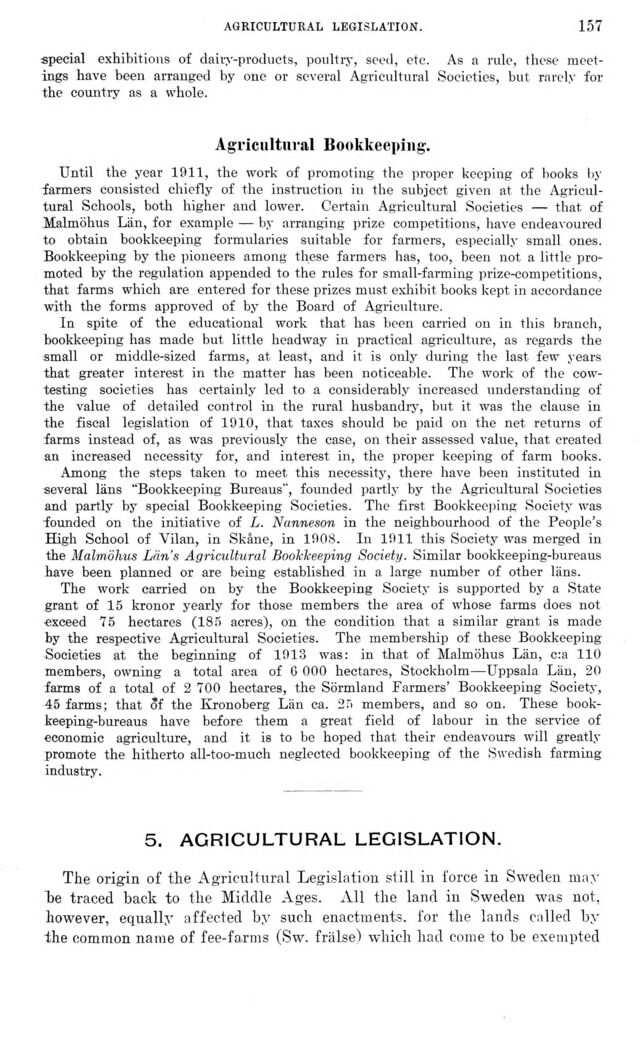
Full resolution (JPEG) - On this page / på denna sida - III. Rural Husbandry. Introd. by H. Juhlin Dannfelt - 4. Public and Private Institutions for the Advancement of Agriculture. Introd. by W. Flach - Agricultural Meetings. By M. Weibull - Agricultural Bookkeeping. By L. Nanneson - 5. Agricultural Legislation. By C. Th. af Ekenstam

<< prev. page << föreg. sida << >> nästa sida >> next page >>
Below is the raw OCR text
from the above scanned image.
Do you see an error? Proofread the page now!
Här nedan syns maskintolkade texten från faksimilbilden ovan.
Ser du något fel? Korrekturläs sidan nu!
This page has never been proofread. / Denna sida har aldrig korrekturlästs.
agricultural legislation.
157
special exhibitions of dairy-products, poultry, seed, etc. As a rule, these
meetings have been arranged by one or several Agricultural Societies, but rarely for
the country as a whole.
Agricultural Bookkeeping.
Until the year 1911, the work of promoting the proper keeping of books by
farmers consisted chiefly of the instruction in the subject given at the
Agricultural Schools, both higher and lower. Certain Agricultural Societies — that of
Malmöhus Län, for example — by arranging prize competitions, have endeavoured
to obtain bookkeeping formularies suitable for farmers, especially small ones.
Bookkeeping by the pioneers among these farmers has, too, been not a little
promoted by the regulation appended to the rules for small-farming prize-competitions,
that farms which are entered for these prizes must exhibit books kept in accordance
with the forms approved of by the Board of Agriculture.
In spite of the educational work that has been carried on in this branch,
bookkeeping has made but little headway in practical agriculture, as regards the
small or middle-sized farms, at least, and it is only during the last few years
that greater interest in the matter has been noticeable. The work of the
cow-testing societies has certainly led to a considerably increased understanding of
the value of detailed control in the rural husbandry, but it. was the clause in
the fiscal legislation of 1910, that taxes should be paid on the net returns of
farms instead of, as was previously the case, on their assessed value, that created
an increased necessity for, and interest in, the proper keeping of farm books.
Among the steps taken to meet this necessity, there have been instituted in
several läns "Bookkeeping Bureaus", founded partly by the Agricultural Societies
and partly by special Bookkeeping Societies. The first Bookkeeping Society was
founded on the initiative of L. Nanneson in the neighbourhood of the People’s
High School of Vilan, in Skåne, in 1908. In 1911 this Society was merged in
the Malmöhus Läns Agricultural Bookkeeping Society. Similar bookkeeping-bureaus
kåve been planned or are being established in a large number of other läns.
The work carried on by the Bookkeeping Society is supported by a State
grant of 15 kronor yearly for those members the area of whose farms does not
exceed 75 hectares (185 acres), on the condition that a similar grant is made
by the respective Agricultural Societies. The membership of these Bookkeeping
Societies at the beginning of 1913 was: in that of Malmöhus Län, c:a 110
members, owning a total area of 0 000 hectares, Stockholm—Uppsala Län, 20
farms of a total of 2 700 hectares, the Sörmland Farmers’ Bookkeeping Society,
45 farms; that öf the Kronoberg Län ca. 25 members, and so on. These
bookkeeping-bureaus have before them a great field of labour in the service of
economic agriculture, and it is to be hoped that their endeavours will greatly
promote the hitherto all-too-much neglected bookkeeping of the Swedish
farming-industry.
5. AGRICULTURAL LEGISLATION.
The origin of the Agricultural Legislation still in force in Sweden may
he traced back to the Middle Ages. All the land in Sweden was not,
however, equally affected by such enactments, for the lands called by
the common name of fee-farms (Sw. frälse) which had come to be exempted
<< prev. page << föreg. sida << >> nästa sida >> next page >>